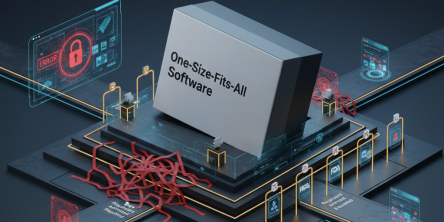Knowledge Management in Software Development
“Through zeal, knowledge is gotten. Through lack of zeal, knowledge is lost. Let a man who knows this double path of gain and loss thus place himself that knowledge may grow.” – Gautama Buddha. Knowledge is much complex and complicated than data or processed information, since it is subjective, usually based on experience and highly provisional.
Knowledge management is the systematic management of a company’s knowledge assets for creating values and meeting tactical and strategic requirements. It includes all the strategies, initiatives, processes, and systems that will make a platform to sustain and enhance the storage, assessment, sharing refinement, and the creation of knowledge. Every organization must define knowledge management in terms of its own business goal. Knowledge management is mainly about applying knowledge in new, previously overburdened or novel situations.
It continues cycle comprised of three processes: Knowledge creation and improvement, Knowledge distribution and circulation, Knowledge addition and application. It incorporates both storing and holding of the knowledge perspective, with respect to the intellectual assets. Knowledge management is a systematic and deliberate collaboration of an enterprise’s people, processes, technology, style and structure in order to add value through innovation and reuse.
Knowledge management can be applied through three distinct perspectives: Content, Containers, and Communities which lead to a different definitions and estimations. It can be implemented for executing the knowledge component of business activities as an explicit concern of business in policy, strategies and practice at all levels of the organization. It also helps us maintaining a direct link between an organization’s intellectual assets both explicit (recorded) and tactics (know –how) and positive business results.
According to cognitive science perspective, in software development knowledge management is the transformation of knowledge in the form of understanding, practical know –how and insights that we all possess in other manifestations like technology, books, practices and traditions within organizations of all kinds and in society. In contrary, according to Technology perspective, knowledge management is the concept which dictates that the information is changed into actionable knowledge and is made available effortlessly in a usable form to the people who can leverage it accordingly on the basis of their requirements.
There are certain applications of knowledge management followed in various key areas. It can be helpful for the globalization of business since the organizations are more universal nowadays i.e... They are operating in multiple nations, multi-cultural and mulch – lingual in nature.
Knowledge management can be used for leaner approaches, organizations are adopted to a lean strategy where they understand clients to focus and value on key processes to continuously increase it. The ultimate goal is to provide perfect value to the client through a perfect value creation process that has zero waste. It helps us to handle corporate amnesia. Everybody is free as a workforce, which creates issues regarding knowledge continuity for the organization and places with continuous learning demands from the knowledge worker. We no longer expect to spend our entire work life with the same organization.
The best we can use knowledge management is through technological advancements. Today’s world is equipped and connected with all kinds of websites, smartphones, and other latest gadgets. Advancement in technology has not only helped in better connectivity but also changed expectations. Companies are expected to have online presence round the clock for fulfilling the needs and information as per the client.
Knowledge management empowers and serves as one of the major consequence to the challenge of trying to handle the complexity in an overloaded work environment. We can best define it as a clustered science of complexity. “To acquire knowledge, one must study. But to acquire wisdom, one must observe. “
Similar Articles
For data intensive industries such as insurance, the global business landscape is undergoing a profound transformation. Thanks to all the relentless technological innovation, this shift presents both significant challenges and unparalleled opportunities for modernization of the insurance sector.
Organizations are always looking for newer technologies to aid their operations. So, this hunt revolves around solutions that offer not only agility and scalability but are also cost-effective.
Not long ago, the idea of multiple AI agents working together, each with a specific role, collaborating to solve problems, felt like science fiction.
In today’s data-driven world, choosing the right business intelligence (BI) platform can make or break your organization's analytics success.
We all know that companies today are no longer limited to a single physical location. Work processes are also no longer strictly isolated.
It is neither secret nor news that the mind-boggling pace of digital transformation around us has totally altered consumer expectations.
In the world of finance, speed and accuracy are everything. Decisions made a day late can cost millions, and delayed visibility into financial performance can leave even the best organizations blind to risks.
Discover the best tools to enhance employee recognition, boost morale, and create a more motivated, engaged workplace culture.
At first glance, off-the-shelf software appears to be a dream come true. They are quick to set up, cheaper upfront, and marketed as “universal.”









